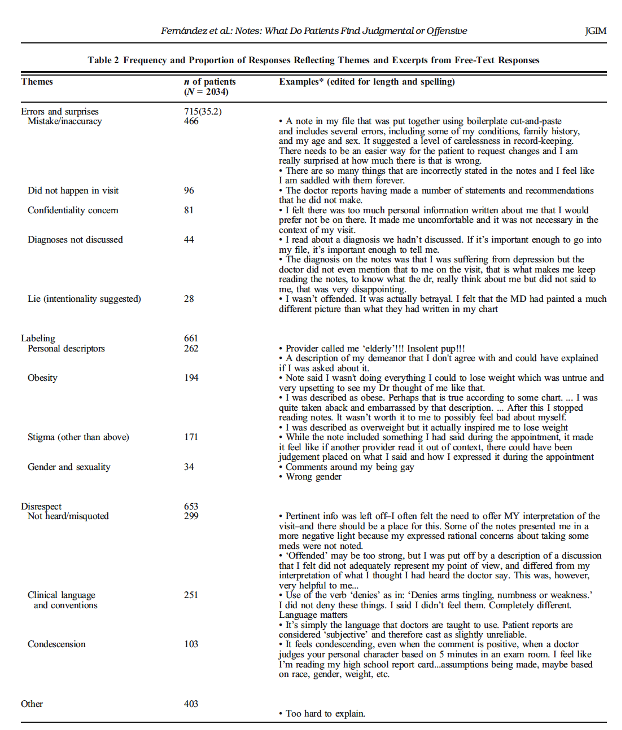
Words Matter. More patients are reading their notes (aka #opennotes). Clinicians wonder:
What do patients find judgmental OR offensive in their notes?
This #medthread is an overview of what we learned. Read the full paper in @JournalGIM: link.springer.com/article/10.100…
#medtwitter 1/8
What do patients find judgmental OR offensive in their notes?
This #medthread is an overview of what we learned. Read the full paper in @JournalGIM: link.springer.com/article/10.100…
#medtwitter 1/8
Sharing notes w/patients can help w/care.
We can use #opennotes to explain, build trust, clarify & remind patients of plan.
BUT notes also offer patients a window into how clinicians view them & their conditions.
Some patients may feel offended or judged by our words. 2/8
We can use #opennotes to explain, build trust, clarify & remind patients of plan.
BUT notes also offer patients a window into how clinicians view them & their conditions.
Some patients may feel offended or judged by our words. 2/8
We analyzed a large web survey of pts at 3 orgs who read AT LEAST one note (n=22,959).
We asked:
✔️Have you ever felt offended by something you read in a visit note?
✔️Have you ever felt judged by something you read in a visit note?
Those who responded YES explained. 3/8
We asked:
✔️Have you ever felt offended by something you read in a visit note?
✔️Have you ever felt judged by something you read in a visit note?
Those who responded YES explained. 3/8
Of those who responded:
1 in 10 ppl (2411) said they EVER felt judged and/or offended by what they read in a note.
Of patients who HAD felt judged and/or offended after reading a visit note, 84.5% shared free text comments explaining why--we did thematic analysis.✍️💻 4/8
1 in 10 ppl (2411) said they EVER felt judged and/or offended by what they read in a note.
Of patients who HAD felt judged and/or offended after reading a visit note, 84.5% shared free text comments explaining why--we did thematic analysis.✍️💻 4/8

📣 BIG PICTURE:
Patients felt judged and/or offended reading #opennotes when
✔️a note contained errors or surprises
✔️a note was labeling
✔️a note showed disrespect or dismissed their concerns
5/8
Patients felt judged and/or offended reading #opennotes when
✔️a note contained errors or surprises
✔️a note was labeling
✔️a note showed disrespect or dismissed their concerns
5/8

WHAT CAN A CLINICIAN DO to write a better note:
Visit notes should:
- reflect the content of the visit--write what you say, say what you write
- record a patient’s perspective respectfully--especially if clinician and pt don't agree
6/8 #opennotes
Visit notes should:
- reflect the content of the visit--write what you say, say what you write
- record a patient’s perspective respectfully--especially if clinician and pt don't agree
6/8 #opennotes
Guidance: Think about how it will sound to the patient
👍 Avoid skeptical, dismissive, labeling language
👍 Mirror the way we speak in a visit
ESPECIALLY when writing notes about those in poor health, unable to work, or who may frequently experience bias
7/8
👍 Avoid skeptical, dismissive, labeling language
👍 Mirror the way we speak in a visit
ESPECIALLY when writing notes about those in poor health, unable to work, or who may frequently experience bias
7/8
Words Matter Notes can increase trust, but also transmit bias.(See work by MC Beach)
Knowing pts are reading notes may prompt medical language to become less judgmental, reduce the transmission of bias to other clinicians, & reinforce healing therapeutic relationships. 8/8 🙏LS
Knowing pts are reading notes may prompt medical language to become less judgmental, reduce the transmission of bias to other clinicians, & reinforce healing therapeutic relationships. 8/8 🙏LS
• • •
Missing some Tweet in this thread? You can try to
force a refresh



